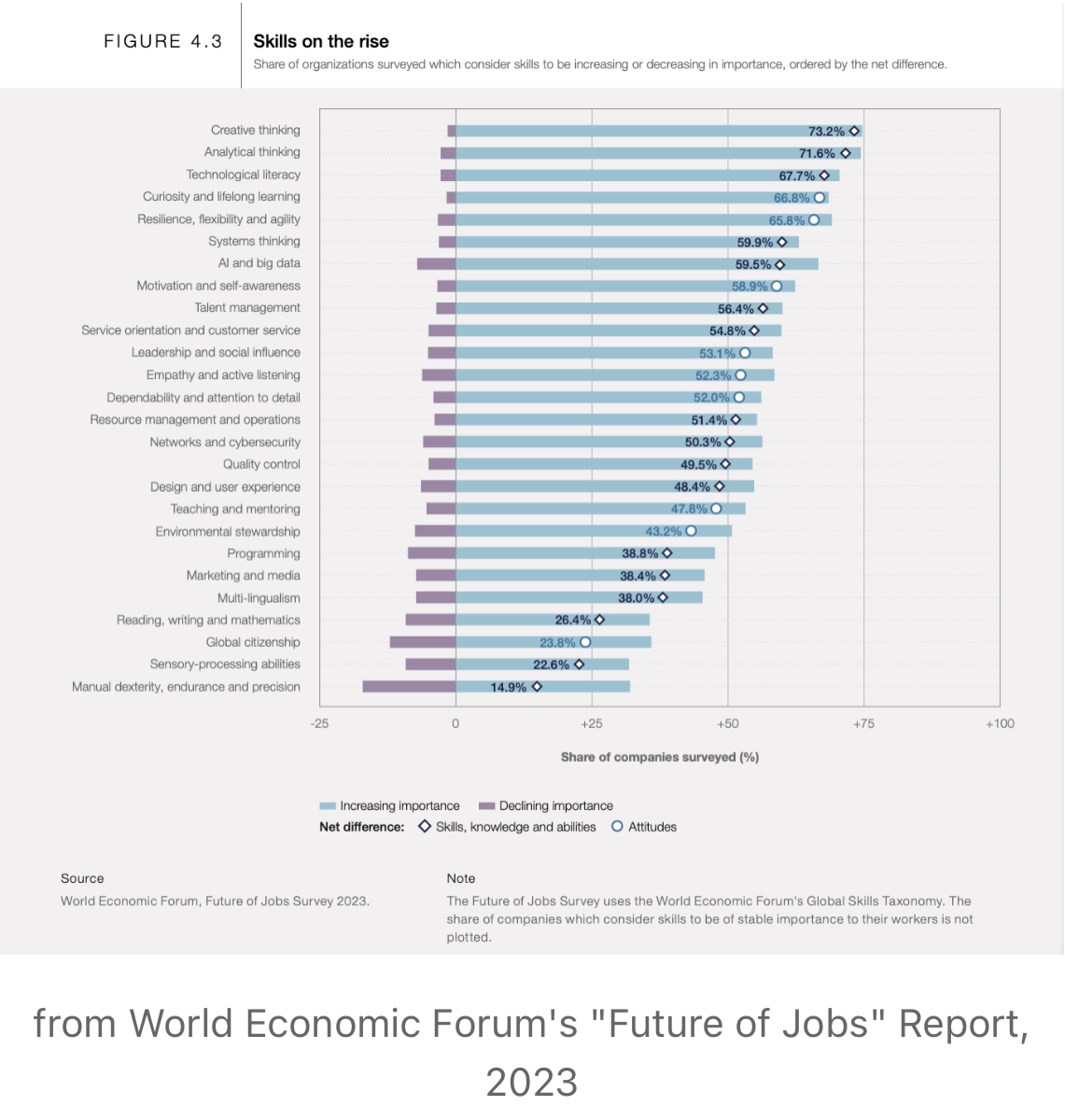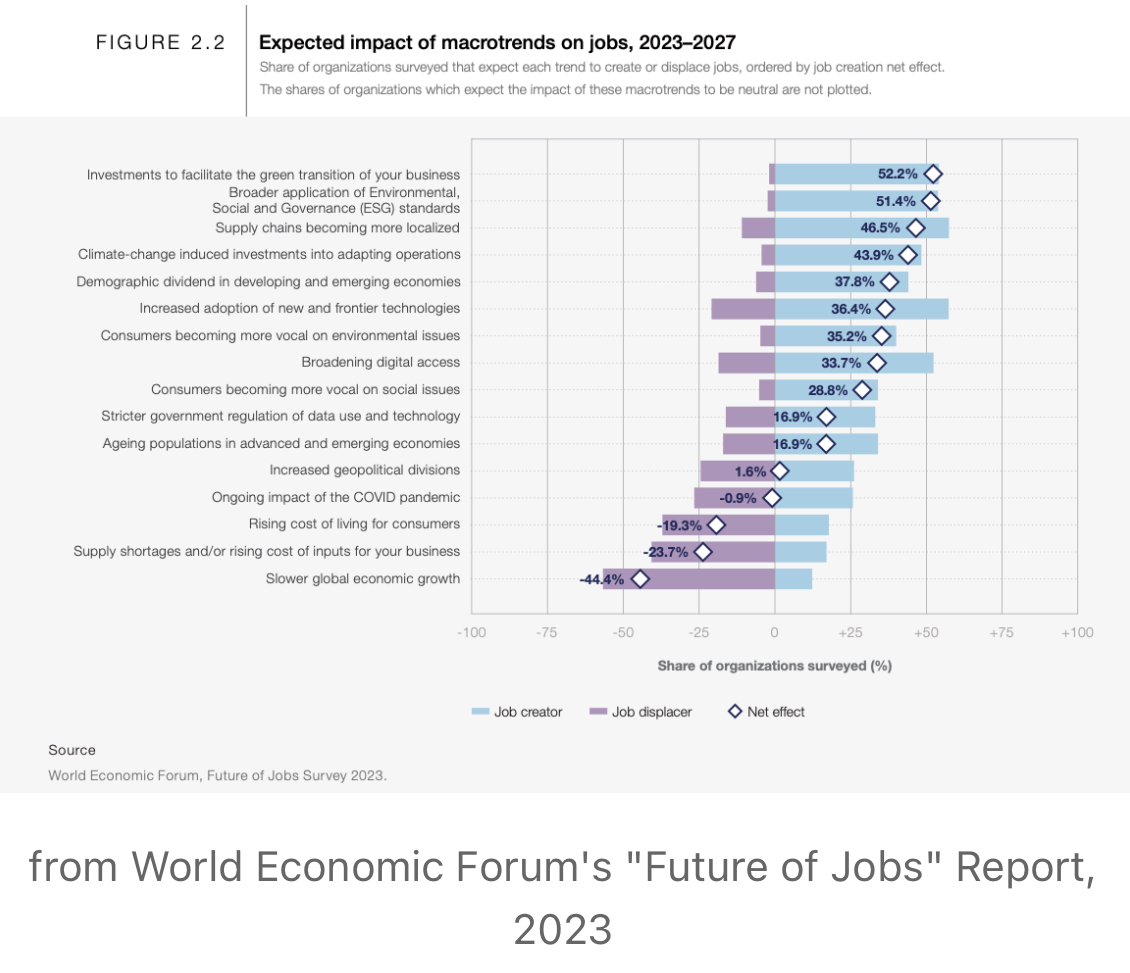In an era marked by rapid technological transformation and global change, the job market is witnessing unprecedented disruptions. The World Economic Forum’s report The Future of Jobs, which came out in May 2023, is a strong reminder that the skills of 44% of workers could become outdated in the next five years.

Photo credit: Microsoft Bing.
As I journey through this changing landscape, representing an Asian country experiencing demographic growth, I have come to realize the challenges and opportunities that lie ahead. This article shares my story, the lessons I have learned, and the insights that can help fast-growing nations and the Global South thrive in this new world of work, with Kazakhstan serving as just one example of the many countries we represent.

Photo credit: Khafizova’s personal archive.
My Quest for In-Demand Skills:
As someone deeply passionate about progress and innovation, I embarked on a journey to acquire the skills most sought-after in today’s ever-changing job market. The call to action is crystal clear, spurred by the transforming nature of work, global geopolitical challenges, digitalization, and the gig economy. It is imperative to prioritize educational initiatives and programs that cultivate creative thinking, analytical skills, and a readiness to embrace technological advancements.
With the rise of AI and automation, we need to anticipate which skills will remain relevant and which will become obsolete. In my case, I have discovered that a combination of skills in my portfolio has played a pivotal role in staying ahead of the curve.
1. Tech Skills: Understanding EdTech, e-learning design, digital marketing, and managing an online business have been indispensable. They allowed me to navigate the evolving landscape and remain relevant. The Future of Jobs report indicates that big data, cloud computing, and AI are expected to be adopted by around 75% of companies in the next five years, emphasizing the increasing importance of these skills.
2. Creativity and Lifelong Learning: Curiosity and a relentless pursuit of new knowledge have opened doors to opportunities I might never have considered. They have proven to be powerful tools for adaptation and growth. In the past years I have been involved in projects ranging from consulting to business development.
3. Adaptability: Instead of merely seeking opportunities, I focused on creating them. This mindset shift, even in the face of uncertainty, empowered me to explore uncharted territories and take calculated risks.
The Future of Jobs report underscores the importance of acquiring skills that not only align with current demands but also anticipate future needs. It is not just about staying relevant; it is about shaping the path forward. As we journey through these transformative times, let’s remember that being proactive and cultivating a diverse skill set, especially in the context of AI, are the keys to thriving in the ever-evolving world of work.

Bridging the Skills Gap:
The Future of Jobs report underscores the skills gap issue, with data showing that 40% of workers will need to reskill by 2027, while only 21% of businesses currently offer adequate learning opportunities. Key priorities include analytical and creative thinking, as well as technology skills such as AI and big data.
This highlights the urgent need for accessible, high-quality learning programs and collaboration between government, businesses, and educational institutions. Investing in on-the-job training is crucial for meeting business goals. By addressing the skills gap, we can ensure our workforce is well-prepared for the changing job landscape in fast-growing Asian countries and the Global South.
It is important to note that our focus should extend beyond just technical skills. We must also nurture creativity, analytical thinking, and competencies that set our workforce apart on the global stage.
Digitalization’s Impact on Jobs:
Digitalization is changing how people work. More and more businesses are not just hiring full-time employees; they are also bringing in temporary workers and freelancers. This is similar to the gig economy, where people do short-term jobs. I have seen this trend while living and working remotely from different places like Europe and Southeast Asia.
Businesses are also using websites, apps, and online sales much more. Around 75% to 86% of companies are doing this. It makes buying and selling things easier and faster.
The report also talks about which jobs will become more or less common because of these changes. Some jobs related to artificial intelligence, sustainability, and data analysis are expected to grow quickly. In simple terms, digitalization is making work more flexible and changing how businesses operate. Some jobs are becoming more important because of these changes.
Countries with fast-growing populations, like Kazakhstan, need to think about these changes. It’s not just about businesses; governments should also make policies that consider the changing job market, especially for the new generation, like generation Z.
The Green Awakening:
With our significant energy dependencies, embracing green technologies is imperative, especially in launching programs to reskill our workforce.
As 62% of businesses anticipate increasing their emphasis on environmental sustainability and 44% prepare to add new green positions over the next five years, the need for green skills is set to surge. The report highlights the potential to create 30 million jobs globally in clean energy, efficiency, and low-emissions technologies by 2030. The data makes it clear: embracing green technologies is not just about sustainability; it is also about creating employment opportunities that are in high demand. Our pursuit of clean energy, efficiency, and low-emissions technologies is not only a commitment to a greener future but also a path to shaping a workforce ready for the challenges ahead.

In my network, I have noticed an increase in professionals specializing in sustainability, which I view as a positive development. I believe that in countries like Kazakhstan, we need to prepare our current workforce in the energy sector for the green transition.
In this rapidly changing world of work, we have learned that being ready for change is essential.
Our journey has shown us that it is not just about learning new technical skills but also being creative, good at solving problems, and open to change. We need to bridge the skills gap and make sure our workforce is prepared for the future. This means working together with our governments, businesses, and educators.
Digitalization is changing how we work, making it more flexible. To handle this shift, countries like Kazakhstan need to think about how businesses and government policies can adapt, especially for the younger generation.
The author is Aigerim Khafizova, an EdTech consultant, founder from Central Asia, and a Fulbright scholar.
The article was originally published on the author’s LinkedIn account.
